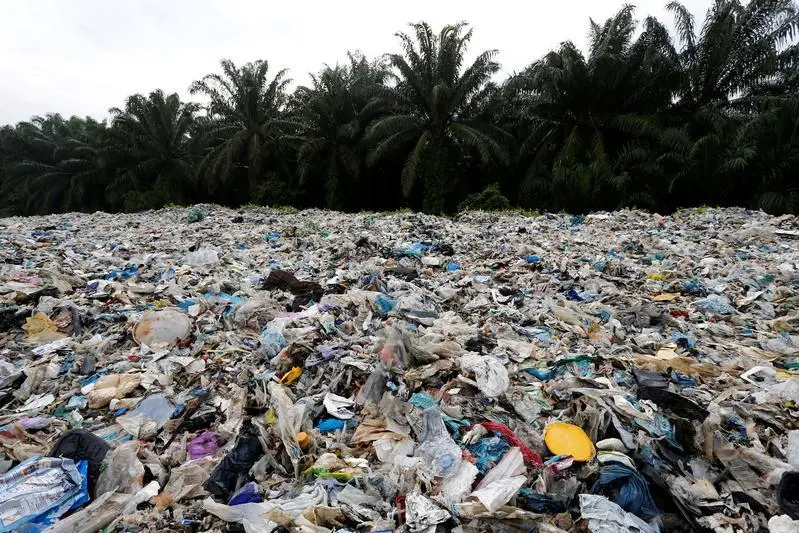PHOTO
Coronavirus and the resulting 'stay-at-home-economy' have stalled China's $36 billion national waste recycling programme.
Plastics usage has risen sharply as people in lockdown or under social distancing make more use of home delivery services. In February, China's leading online grocery store saw a 220 percent increase in orders, compared to the same period last year.
The government funded programme for greening China's economy, NAMA (China Integrated Waste Management), formed by China's Ministry of Housing and Urban-Rural Development, and the Association of Urban Environmental Sanitation, have reported huge spikes across various sectors and highlighted issues faced with keeping the recycling programme on track during the current crisis.
The recycling programme "aims to transform the Chinese waste management sector as part of a sustainable, low-carbon and circular economy. The overarching project goal is to induce a transformational change in the way that waste is segregated, collected, treated or recycled and reused in an integrated and low-carbon manner," according to the NAMA website.
In its latest report, NAMA said the pandemic has "significantly changed people's consumption behaviour.
"The "stay-at-home economy" is booming due to social distancing. People tend to purchase fresh produce in online groceries. In February 2020, the online orders at Fresh Hema (an online grocery store) increased by 220 percent in comparison to the same period a year ago.
"Then, the average number of daily online orders in a single store was 1,200...which means that the pandemic has resulted in additional 2,640 orders. Even based on a modest estimate that one shop has used one plastic bag per order, in February all 153 Hema stores in China would use 11.71 million extra plastic bags."
"In addition, the quarantine has also reshaped purchasing behaviours of middle aged and elderly people, making them buy more online. It can be assumed that they will continue buying fresh produce and daily necessities in online groceries in the future."
The report added that the average daily order volume on Taobao (one of the biggest Chinese e-commerce platforms) also saw a significant increase: 12 million orders more in March 2020 in comparison to December last year.
"Given the increase in sales on the Taobao platform in March, it can be estimated that at least 57,895 tonnes of waste carton boxes and 7,800 tonnes of waste plastic will be generated on top of already existing volumes of packaging waste."
The coronavirus pandemic has also impacted plastics use in the catering and dining industries, driving restaurants to develop food delivery systems due to restricted dine-in services. The Consumption Report on Food Delivery after Resumption released by Meituan (one of the largest food delivery platforms in China) shows that even after resuming work, 30 percent of restaurants receive more takeaway orders than in the "pre-corona" times.
"This is likely to result in an increase in plastic waste associated with food packaging," the researchers said.
Recycling industry suffers losses
In China's 13th Five-Year-Plan (2016-2020), Chinese government announced that approximately 251.84 billion Chinese yuan (about €32.8 billion) of total investment would be earmarked to cater to the rising need for waste management solutions.
Meanwhile, the plastic recycling system has been in hibernation during the outbreak, according to the NAMA report.
Large numbers of waste collection workers had to stay at home, while those "on duty" could not enter communities to retrieve valuable waste from community garbage bins due to restricted entry policies. This resulted in the pile-up of plastic recyclables generated by households.
Since mid-March, after the work resumption, the situation has improved, but more time is needed for the plastic recycling system to be back on track fully.
With more plastic packaging waste and less front-end recycling capacity, there is a higher risk of increased volumes of plastic waste polluting the environment, the report added.
The plastic recycling industry overall has also been facing economic losses. According to a survey conducted by China Plastic Recycling Association of China Resource Recycling Association (CRRA), about a fifth (21.74 per cent) of enterprises in the sector were severely affected by COVID-19 with an estimated revenue drop of 90 percent in the first quarter 2020.
In the meantime, a vast majority of companies (around 70 per cent) reported various degrees of impact brought by COVID-19: revenues of 36.96 percent enterprises were estimated to fall 50-90 per cent in the first quarter of 2020, whereas 34.75 percent enterprises experienced 10-50 percent decrease in earnings.
Also, as oil prices plummet against the backdrop of an overall economic slowdown due to the pandemic, prices of virgin plastic materials went down as well, making them increasingly hard to beat by the struggling recycling industry, which further cut down their demand in downstream industries, according to the report's authors.
The question of how to maintain the progress made towards a circular economy, minimise economic losses in and resume stable operation of the plastic recycling industry under the challenging conditions the world is facing now, becomes one of the serious concerns of the year 2020.
(Writing by Charles Lavery; Editing by Anoop Menon)
(anoop.menon@refinitiv.com)
#CHINA #PLASTIC #RECYCLING #CIRCULARECONOMY #Belt and Road Initiative
Disclaimer: This article is provided for informational purposes only. The content does not provide tax, legal or investment advice or opinion regarding the suitability, value or profitability of any particular security, portfolio or investment strategy. Read our full disclaimer policy here.
© Thomson Reuters Projects News 2020





















